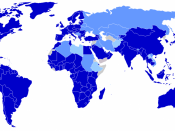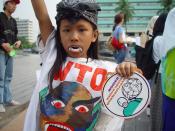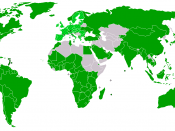An astounding achievement ascribed to the GATT pioneers is the disciplining of trade instrument i.e. negotiated level of tariffs by WTO members levied on foreign goods, herein referred to as default tariffs. Tariff volatility has been avoided through bound default tariffs. An exception of the MFN default tariff is the preferential tariff applicable to growing economies and those levied across members of a preferential trade agreement, a customs union or a free trade area.[1: P C Mavroidis, 'From GATT 1947 to GATT 1994', Trade in Goods, Chapter 1 (2008), Oxford Scholarship Online < http://www.oxfordscholarship.com.ezproxy.liv.ac.uk/oso/private/content/law/9780199552139/p035.html#acprof-9780199552139-chapter-1> Accessed July 4 2013]
GENERAL MOST-FAVOURED-NATION TREATMENT
Article I:1 of the GATT 1994, titled 'General Most-Favored-Nation Treatment' forbids discrimination between like products coming from, or headed for, various states. The primary objective of the MFN treatment requirement is to safeguard egalitarianism in importation from or exportation to all WTO members. Van den Bossche claims that the actual presence of these MFN-type clauses proves the pervasiveness of the MFN principle of non-discrimination.
He asserts that the significance of the MFN treatment obligation to the multilateral trading system is unquestionable, however the increase of customs unions, trade liberalization arrangements and other special agreements have caused world trades extreme non-compliance with the MFN treatment obligation. Article I:1 lays out a three-stage assessment of consistency that must be solved to decide whether there is an infringement of the MFN treatment requirement. These tests are :( 1) Whether the matter at hand grants a trade benefit, favor, privilege, or immunity; (2) Whether the products involved are 'like products' and (3) Whether the benefit under consideration is granted 'immediately and unconditionally to all like products concerned'. The first test comprises subjects such as Customs charges, further duties on imports and exports, and other customs matters; domestic taxes and rules upsetting the...


